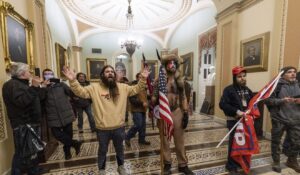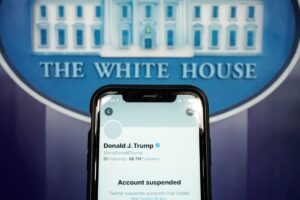- Among the more than 74 million Americans who voted for Donald Trump, many are diehard supporters who, having anticipated an unpalatable election outcome, have armed themselves and will not hesitate to take to the streets again
![]()
Peter G. de Krassel
Published: 3:30am, 15 Jan, 2021
Has the US embarked on its third revolution? This is the question in many minds after the world’s richest and most powerful democracy saw its Capitol attacked and ransacked by angry Donald Trump supporters who dispute the results of November’s presidential election.
This was the first attack on the US Capitol since 1814, when British forces entered the city during the War of 1812.
The invasion of the Capitol, while Congress was tallying the Electoral College votes to certify Joe Biden’s election as US president, was the flashpoint that may well have sparked a third revolution.
“Storming the Capitol on the direction of the president is something we have not seen before. There isn’t a historical precedent,” said Nicole Hemmer, a presidential scholar at Columbia University. “This cannot be categorised as a peaceful transfer of power.”
Trump supporters storm US Capitol, interrupting Congress’ certification of Biden’s victory
There have been many mass protests in Washington over the years, but none that were aimed at overthrowing the government.
The first and second revolutions – the American Revolutionary War (1775-1783) and the Civil War (1861-65) – from which today’s United States emerged, saw thousands killed and injured. Since then, Americans have peacefully elected their presidents to form a government and administer the nation. The outcome of the electoral process has sometimes been disputed, but it has always been resolved peacefully.
Not this time, however. Five people died in the insurrection of January 6, including an air force veteran and a police officer. The message from the events of the day was: “America, we have a problem!”
More than 159 million voters took part in November’s election – the largest turnout in the nation’s history. Some 74.2 million voted to grant incumbent Donald Trump a second term, while 81.3 million favoured his challenger, former US vice-president Joe Biden.
Biden received 7 million more votes than Trump. Yet Biden was within 43,000 votes of losing the election because of the Electoral College system that determines the winner.

Supporters of President Donald Trump stand outside the Senate Chamber in Washington on January 6. Photo: AP
Trump and the 74-million-plus people who wanted to keep him in office for another four years believe there has been electoral fraud. Their attempt to prove it in court has, however, failed because of a lack of tangible evidence.
James M. Lindsay writing for the Council on Foreign Relations notes: “When you look at the smallest popular vote shift needed to give Trump a victory, the 2020 election was close. Indeed, it was even closer than 2016.”

US House tells Mike Pence to do his duty and remove Trump from office
He points out that “if Trump picked up the right mix of 42,921 votes – in Arizona (10,457), Georgia (11,779), and Wisconsin (20,682), the Electoral College would have been tied at 269 all”.
And, if he had also picked up “the one electoral vote in Nebraska’s Second Congressional District, which he lost to Biden by 22,091 votes, he would have won the Electoral College outright.”
Is it any wonder, then, that the president was calling state officials and asking them to “find votes”?
[Audio] In clip released by Washington Post, Trump pushes Georgia official to change poll results
Against this scenario, Congressman Mo Brooks and Senator Ted Cruz led the bid to convince members of the House and Senate, who were getting ready to certify the Electoral College votes on January 6, to throw out the results in several states and call for a re-election.
On January 6, the US’ resolution to remain the republic the founding fathers envisioned was tested like never before – thanks to social media, a 21st-century revolutionary tool that weaponised cancel culture identity politics.

Can Trump keep grip on Republicans without his potent political weapon?
The US was founded on a revolutionary political idea – government of the people, by the people, for the people. In short, a government rooted in people power.
The US was founded on a revolutionary political idea – government of the people, by the people, for the people. In short, a government rooted in people power.
Trump and his supporters are now aiming to use this to achieve their goal through social media conspiracy theories instead of via the ballot box.

QAnon demonstrators protest against child trafficking, on Hollywood Boulevard in Los Angeles on August 22. On January 11, Twitter announced it has suspended “more than 70,000 accounts” linked to the QAnon conspiracy theory following the attack on the US Capitol. Photo: AFP
That Kamala Harris, a woman of colour, will be US vice-president, and that black and Jewish Democrats won two conservative Deep South Georgia Senate seats to give Democrats control of Congress as well as the White House is, in many American minds, a valid reason to rebel if you are white and feel marginalised by the political elite and immigrants.
Among the 74 million Trump voters are many diehard supporters who, having anticipated an unpalatable outcome, armed themselves to the teeth well before the election.
They will not hesitate to take to the streets in every major town and city – including Washington, again, on January 20 when Biden is sworn in. Trump will be absent from the inauguration ceremony, perhaps instead pondering his legal battles after having been impeached for inciting the deadly attack on the Capitol.
The Civil War that abolished slavery was the nation’s second revolution – much bloodier than the first. Will the third revolution be bloodier, or bloodless? Does the US really need to lose more lives to settle an election result?
Peter G. de Krassel is a Hong Kong-based political analyst, contemporary social commentator and author of the Custom Maid books and blogs.

